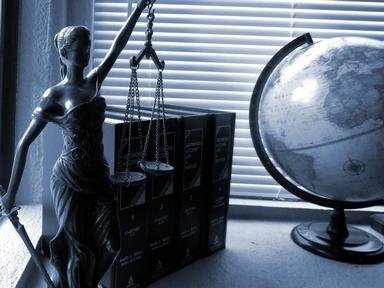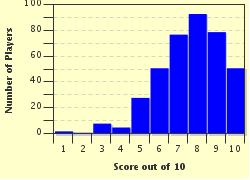Quiz Answer Key and Fun Facts
1. In the 1600s, Puritan New England was not a friendly atmosphere if one wanted to celebrate Christmas. The pilgrims of Plymouth Colony showed their disdain for the holiday by spending their first Christmas Day working in the fields; the holiday was eventually outlawed. What did the Puritans in New England call Christmas?
2. Parliament under Oliver Cromwell outlawed the eating of festive meals on Christmas Day, leading many in modern-day England to believe that they cannot "legally" eat what famous English Christmas treat?
3. In 1980, the U.S. court case Florey v. Sioux Falls School District went to the Eighth Circuit Court of Appeals. Roger Florey, the plaintiff, brought the lawsuit on his child's school because of what principal concern?
4. Leftovers from Prohibition, many U.S. states and Canadian provinces have had legal bans on the sale of which of the following on Christmas Day?
5. Restaurants in London and elsewhere have asked their customers to sign what legal document before they eat their Christmas pudding (or plum pudding as it is sometimes known) in case they chip a tooth on the silver coins that are often hidden within?
6. Plaintiffs in the U.S. have filed multiple lawsuits against an Arizona sheriff because he has played Christmas music 12 hours, non-stop, in what venue?
7. In 2001, a receptionist in Ontario, Canada, sued her employer, Sutton Group Incentive Realty, after she left her employer's Christmas party, drove home intoxicated and hit another car. The receptionist claimed her employer was responsible because they should have prevented her from leaving the Christmas party. What was the original ruling of the case?
8. A Canadian filmmaker sued what production company (which is also associated with a greeting card company) for $7 million (USD) after he claimed that they stole his idea for a Christmas film about a boy who meets an angel and gains the power to fly?
9. Signed into law by U.S. President George W. Bush, the Energy Independence and Security Act of 2007 banned the use of incandescent light bulbs used in outdoor Christmas displays.
10. In November 2014, a Manhattan landlord sued a Christmas tree vendor outside his residential building, claiming the vendor took up parking spots and blocked pedestrian traffic. The lawsuit cited an obscure 1938 law that claimed what?
Source: Author
trident
This quiz was reviewed by our editing team before going online.
Any errors found in FunTrivia content are routinely corrected through our feedback system.

